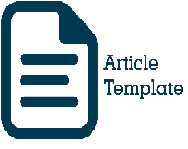Maqashid Sharia Analysis of Change From Customers for Donation: a Case Study in Fajar Toserba, Jalaksana District
Abstract
The Qur'an and Islamic legal literature do not mention the word Islamic law as one of the terms in the Qur'an is the word syarî'ah, fiqh, Allah's law, and the same root with it. The term Islamic law is a translation of Islamic Law in western literature. If traced to its roots, then the meaning of Islamic law is "control or bridle of the horse", what is meant here is that in essence the law exists to regulate people who are subject to the law itself. Other meanings derived from the root word hakama include preventing injustice, preventing tyranny, preventing persecution, and rejecting other mafsadat. The research on Maqashid Syariah analysis of the ask foral of change for donations (a case study in Fajar Toserba, Jalaksana District) aims to understand how the practice of asking for change for donations is, how the distribution of these donations when they have been collected, and how Muqashid Syariah analyzes the practice of asking for change for donations. donation. This study uses a descriptive qualitative method because it describes the data in the form of a written description. Types and sources of data in this study using primary and secondary data. Data collection techniques through interviews and observations. The results of this study are on the ask foral of change for donations at Fajar Toserba Jalaksana when buying and selling transactions. As for the practice, when buying and selling at Fajar occurs, if there is odd nominal money, it is directly distributed to the social fund in the payment receipt. Maqashid Sharia analysis on this matter can be concluded that the five main points or al-mabaadi 'al-khamsyah have been fulfilled. customers for change for donations and distributing the donation money have fulfilled the purpose of Islamic law itself, namely Maqashi Syariah. Although there are elements that should not be done, in this case, the benefits are greater.
Keywords
Full Text:
PDFReferences
Adam, P. (2018). Fatwa-Fatwa Ekonomi Syariah Konsep, Metodologi, dan Implementasinya pada Lembaga Keuangan Syariah (Tarmizi & M. Akbar (Eds.)). Amzah.
Afifuddin, H., & Saebani, B. A. (2012). Metodologi Penelitian Kualitatif (2nd ed.). Pustaka Setia.
Alwi, A. B. (2018). Pembiayaan Berbasis Teknologi Informasi (Fintech) yang Berdasarkan Syariah. N, Jurnal Pemikiran Dan Pembaharuan Hukum Islam, 21(2).
Aulia, S. (2020). Pola Perilaku Konsumen Digital dalam Memanfaatkan Aplikasi Dompet Digital. Jurnal Komunikasi, 12(2). https://doi.org/http://dx.doi.org/10.24912/jk.v12i2.9829
Az-Zuhaili, W. (2011). Fiqih Islam Wa Adillatuhu. Gema Insani.
Cahyani, I. P. (2020). Membangun Engagement Melalui Platform Digital (Studi Kasus Flip Sebagai Start-Up Fintech). Jurnal Ilmu Komunikasi, 3(2).
Cara Kirim Uang via Flip. (2021). Flip. https://flipid.zendesk.com/hc/id/articles/360021130791-Cara-Kirim-Uang-via-Flip
Cara Membuat Akun Flip. (2021). Flip. https://flipid.zendesk.com/hc/id/articles/360039488492-Cara-Membuat-Akun-Flip-
DSN-MUI. (2000). Tabungan.
DSN-MUI. (2002). Jual Beli Mata Uang (Al-Sharf).
Dwimurti, B. S. (2020). Transfer Dana Beda Bank Tanpa Biaya Administrasi Melalui Aplikasi Flip Dalam Tinjauan Etika Bisnis Islam. Jurnal Ilmiah Mahasiswa Studi Syariah, Hukum Dan Filantropi, 2(2).
Ernawati, sulung S. (2017). Tinjauan Hukum Islam Terhadap Pembayaran Kode Unik Dalam Jual Beli Online Di Tokopedia. Penelitian Bersama.
H, D. (2018). Akad dalam Transaksi Ekonomi Syari’ah. 12(2).
H, S., Ariyadi, & Norwili. (2020). Fikih Muamalah Memahami Konsep dan Dealiktika Kontemporer. K-Media.
Hasan, A. F. (2018). Fiqh Muammalah dari Klasik hingga Kontemporer. UIN-Maliki Press.
Hasibuan, sri J. (2019). Hukum Jual Beli On-Line dengan Kode Sebagai Harga Perspektif Yusuf Al-Qaradhawi. Penelitian Bersama.
Khosyi’ah, S. (2010). Wakaf dan Hibah Persfektif Ulama Fiqh dab Perkembangan di Indonesia. CV. Pustaka Setia.
Lutfi, M. (2020). Penerapan Akad Wadiah di Perbankan Syariah. Madani Syariah, 3(2).
Nugrahani, F. (2014). Metode Penelitian Kualitatif dalam Penelitian Pendidikan Bahasa. Cakra Books.
Putri, A. A. (2020). Pengaruh Kemudahan Penggunaan Kemanfaatan, Dan Kepercayaan Majelis Taklim Hayatul Ilmi Surabaya Terhadap Minat Menggunakan Flip.id Dengan Perspektif Hifdzul Mal. Penelitian Bersama.
Raco, J. . (2010). Metode Penelltlan Kualltatlf Jenis, Karakteristik, dan Keunggulannya. PT Gramedia Widiasarana Indonesia.
Rahma, D. A. (2020). Kode Unik Dalam Transaksi E-Commerce Di Tinjau Dari Hukum Ekonomi Syariah Dan Hukum Perlindungan Konsumen Pada Toko Online Deavhijab. Penelitian Bersama.
Rifaldi. (2019). Transaksi E-Commerce Pada Facebook Marketplace Dalam Perspektif Ekonomi Islam. Universitas Islam Negri Alauddin Makassar.
Sa’diyah, D. F. (2019). Penerapan Akad Wadi’ah pada Produk Simpanan Idul Fitri di LKMA Syari’ah Amanah Mandiri Desa Sekarputeh Kecamatan Bagor Kabupaten Nganjuk. Jurnal Dinamika Ekonomi Syariah, 6(1).
Siyoto, S., & Sodik, A. (2015). Dasar Metodologi Penelitian (Ayup (Ed.); 1st ed.). Literasi Media.
Sudiarti, S. (2018). Fiqh Muamalah Kontemporer. FEBI UIN-SU Press.
Sugiyono. (2013). Metode Penelitian Kuantitatif Kualitatif dan R&D. Alfabeta.
Sukmayanti, A. (2020). Tinjauan Ekonomi Islam terhadap Akad pada E-Commerce Study Kasus Tokopedia. 3(2).
Syariah, D. P. (2015). Kumpulan Khotbah Bisnis dan Keuangan Syariah. Otoritas Jasa Keuangan.
Syarqawie, F. (2014). Fikih Muamalah (2014th ed.). IAIN ANTASARI PRESS.
Yarli, D. (2018). Analisis Akad Tijarah Pada Transaksi Fintech Syariah Dengan Pendekatan Maqhasid. Jurnal Pemikiran Hukum Dan Hukum Islam, 9(2).
DOI: https://doi.org/10.46899/jeps.v9i2.279
Article metrics
Refbacks
- There are currently no refbacks.
Copyright (c) 2021 Alfan Syafi'i, Ega Kusuma Dewi

This work is licensed under a Creative Commons Attribution-NonCommercial-ShareAlike 4.0 International License.
Indexed By:
Address: Jl. Raya Bojongsari, Pondok Rangga, Kec. Sawangan, Kota Depok, Jawa Barat 16517, Indonesia










